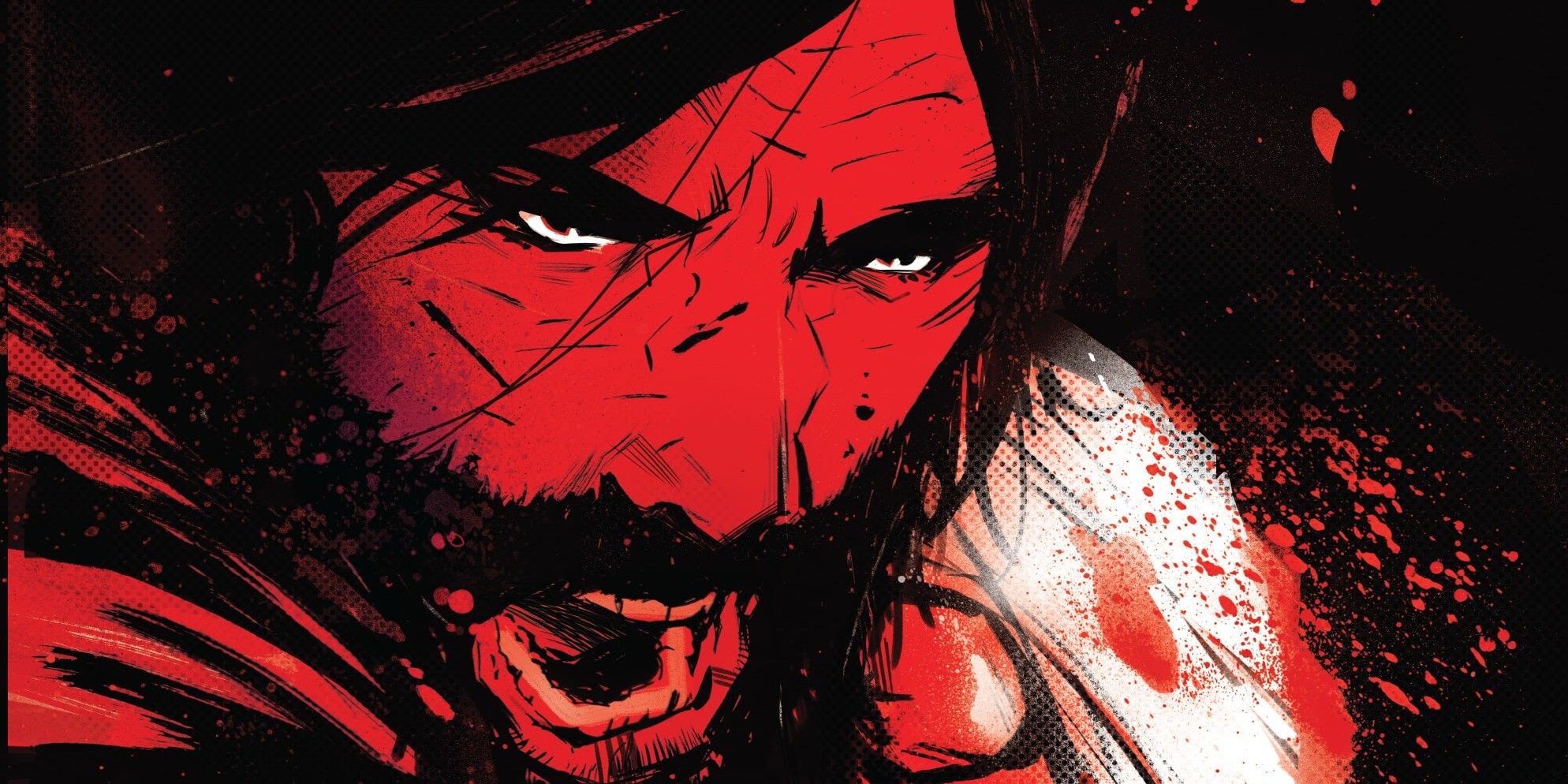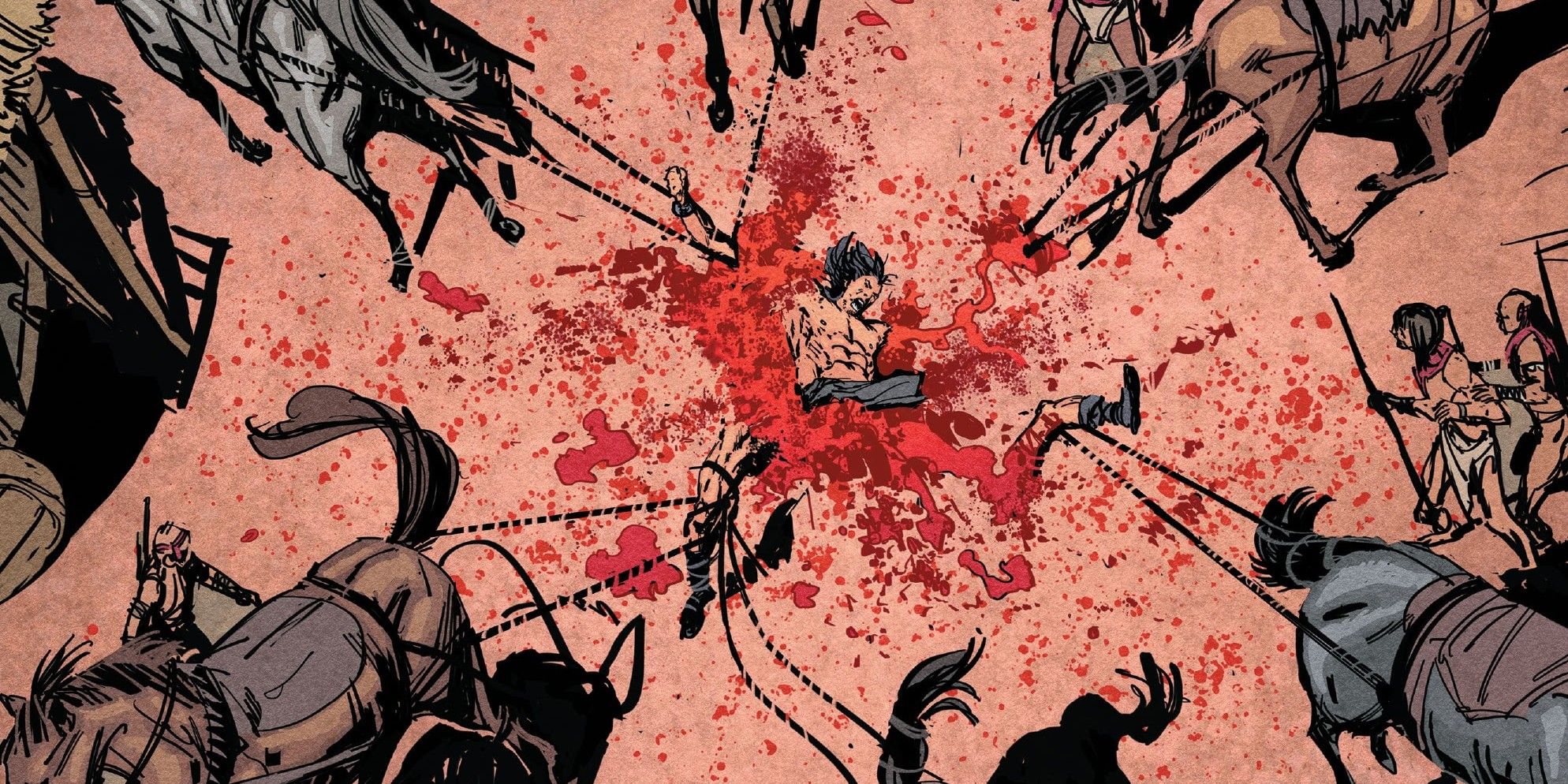
Warning: Spoilers ahead for BRZRKR #5, which is a MATURE comic
Why do we fight, and why do we love? These are the questions Keanu Reeves’ BRZRKR is asking in its customary, visceral fashion, as the brushstrokes of this artistic quandary seem to be painted in mostly red. It’s been a raw and emotionally-reeling ride in the breakout hit published by Boom! Studios, but it appears this tale of violence and mayhem is only just beginning, as the greater shape of Reeves’ philosophical message begins to emerge. Taking the reader through the adventures of the godlike Reeves-analogue B. and the blood-soaked span of his 80,000-year life, a pattern begins to form in the inevitability of violence in the course of his existence, and the seeming futility of love.
BRZRKR, written by Reeves and Matt Kindt with art by Ron Garney, has already covered a lot of ground since it began a mere five issues previously. Begun as a typical super-powered monstrosity yarn, with the ploy being the incredible amount of violence depicted in the comic, the series has already moved on to quite comprehensively existential, philosophical questions regarding the nature of its tortured hero. An inexorably tireless, and merciless warrior, B. is also stark, deeply tragic figure, who makes a deal with the U.S. Government to perform black ops in exchange for finding the secret to his immortality, so he might finally die. Being a half-mortal, half-god figure akin to ancient demigods of the past, the first four issues mostly concern his origin 80,000 years previously as a young tribesman born of a human mother following a strange religious ritual, a child of brutal, violent impulses who eventually fails to protect the village he was born to save.
The fifth and most recent issue of the 12-issue miniseries, sees further events transpire after B.’s village falls, focusing instead on his past romantic experiences. The issue opens with B. discussing music at his home with the lovely scientist studying him, Diana Ahuja, in characteristically cynical fashion. B. says that, no matter the song, there’s always a lost, lonely voice at the bottom of it begging for some kind of connection. The story then rapidly expands to portray another harrowing aspect of B.’s hellish life, that he is unable to produce any live offspring, and has seen many lovers over his lifetime grow old and die while he remains young and alone. In this way, love, which is ostensibly one of the only reasons why one fights for anything, is revealed to simply be another source of pain for B.

In this regard, Reeves and Kindt are suggesting that B.’s life of brutal warfare and horrific violence are in some ways preferable to him over any joys domestic life might bring him, as the pain of watching his partners deliver stillborn children and then wither away and die in old age is actually far greater than being literally torn limb from limb. That, when combined with his inborn impulse towards violence, keeps him on the path of bloodshed in the present day.
This concept becomes only more weighty when juxtaposed with the superhero culture that continues to dominate comics as well as the greater media landscape: what is the ultimate message this fantasy-warrior culture is sending to their audience in these constant tales of violence when taken to their logical extent? In the case of B., it appears this is taken as a pessimistic lesson: that this enduring glorification of violence is due to the inherent despondency of the human condition, and its difficulty in handling emotional pain. B.'s philosophy seems to be that it is better to battle foes one can defeat on the battlefield than those that remain beneath the surface, forever in ones’ thoughts. Anything is better than a broken heart and the sting of inevitable failure.
Is there any release from the pain, or is B. doomed to suffer eternally? BRZRKR #5 is on sale now, wherever comic books are sold.
from ScreenRant - Feed https://ift.tt/39Xn3G7
via IFTTT







0 comments:
Post a Comment